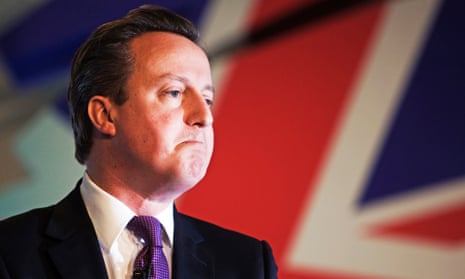In the wake of the 2009 expenses scandal – in which MPs were found to have submitted claims for among other things a £1,600 floating duck house and a £2,200 bill for cleaning a moat – the then-Conservative leader David Cameron warned that political lobbying would be “the next big scandal waiting to happen”.
Cameron took it upon himself to reform “the far-too-cosy relationship between politics, government, business and money”, which he said had “tainted our politics for too long”.
More than a decade later, the former prime minister is caught up in what could turn out to be exactly the kind of lobbying scandal he once sought to eradicate. It involves the collapse of a $7bn (£5bn) bank, text-message lobbying of the chancellor of the exchequer, and a desert camping trip with the Saudi prince accused of ordering the brutal murder of a journalist.
When he resigned as both PM and a Conservative MP shortly after losing the 2016 Brexit referendum, Cameron promised he would not become a political “distraction”.
He would, he said, be too busy writing his memoirs in his two £25,000 shepherd’s huts at holiday homes in the Cotswolds and Cornwall.
His book, For The Record, wasn’t a hit with the critics. It sold just 65,000 in its first year, far below the 350,000 sales of Tony Blair’s book A Journey and less than the 91,500 copies of John Major’s autobiography, according to figures collated by Nielsen Book Research.
— John Harris (@johnharris1969) September 24, 2020
He also squeezed in a little public speaking at a rate of £120,000 an hour at the Washington Speakers Bureau.
It’s not too bad an hourly rate, but Blair has been paid up to $500,000 (£365,000) for a 20-minute speech.
His company, the Office of David Cameron Limited, made a profit of £836,000 in 2019 – the most recent year available at Companies House. But sources close to Cameron have suggested he may feel his post-political career has not turned out as successfully as that of his Cabinet colleagues.
George Osborne, who was Cameron’s chancellor, has worked as editor of the Evening Standard and is now a partner at an investment banking firm where the previous two partners have shared out £207m in pay over the last six years.
Nick Clegg, the Liberal Democrat deputy prime minister under Cameron, is now Facebook’s vice-president of global affairs, and said to earn a “seven-figure salary”.
There was a period, soon after the actor Danny Dyer described Cameron as a “twat” who had scuttled off to Europe “with his trotters up” in 2018, that Cameron was said to have told friends he was “bored shitless” and was considering a return to politics, according to The Sun.
It has now emerged that Cameron took a different direction, signing up as lobbyist for controversial billionaire banker Lex Greensill, whose eponymous bank collapsed into administration earlier in March. Greensill Capital’s demise has plunged other businesses into crisis including Liberty Steel, which employs 5,000 people in the UK.
Cameron reportedly told friends that he was granted stock options worth up to 1% of the company. Last year, Greensill was hoping to float on the stock market at a $7bn valuation, which would have valued a 1% stake at $70m (£51m).
While he was working hard to secure his potential windfall, Cameron failed to declare his work for the bank with the official Register of Consultant Lobbyists – a watchdog designed to increase transparency in the murky world of lobbying and introduced under his own premiership.
Cameron’s work for Greensill has included lobbying the chancellor, and, according to the Financial Times, going camping in the desert with Lex Greensill and Mohammed bin Salman, the Saudi crown prince who was found by the US authorities to have approved the 2018 murder of the Washington Post journalist Jamal Khashoggi inside the Saudi consulate in Turkey.
Greensill is said to have boasted that Cameron helped him bond with Mohammed bin Salman. The trip to Saudi Arabia came soon after Cameron prompted public outcry with another visit to the kingdom for the October 2019 “Davos in the Desert” summit.
The trip came just days after SoftBank, the investment fund run by Japan’s richest man Masayoshi Son, announced it was investing a further $655m in Greensill. Softbank’s Vision Fund was one of Greensill’s biggest investors having invested about $1.5bn, before the collapse. The biggest investor in the Vision Fund is Saudi Arabia’s sovereign wealth fund.
Cameron is said to have repeatedly texted Chancellor Rishi Sunak’s private phone asking him to give Greensill special access to millions of pounds of emergency Covid loans during the height of the coronavirus crisis in March last year.
He also held 10 virtual meetings between March and June 2020 with the second permanent secretary to the Treasury and other senior figures, according to transparency records. Soon afterwards, Greensill was accredited as a lender under the coronavirus large business interruption loan scheme.
Cameron did not respond to requests for comment, and has not spoken publicly about his work for Greensill.
The Register of Consultant Lobbyists investigated Cameron’s lobbying of Sunak but found that the former PM did not breach the rules as they only apply to third-party lobbyists and not in-house lobbyists. “Based on detailed information and assurances provided, Mr Cameron’s activities do not fall within the criteria that require registration on the Register of Consultant Lobbyists,” the watchdog said.
Kwasi Kwarteng, the business secretary, insisted that Cameron had done “absolutely nothing wrong” in his work for Greensill. Speaking on Sky News on Tuesday, Kwarteng said now that Cameron had been cleared of breaking lobbying rules, people should now “just move on”.
